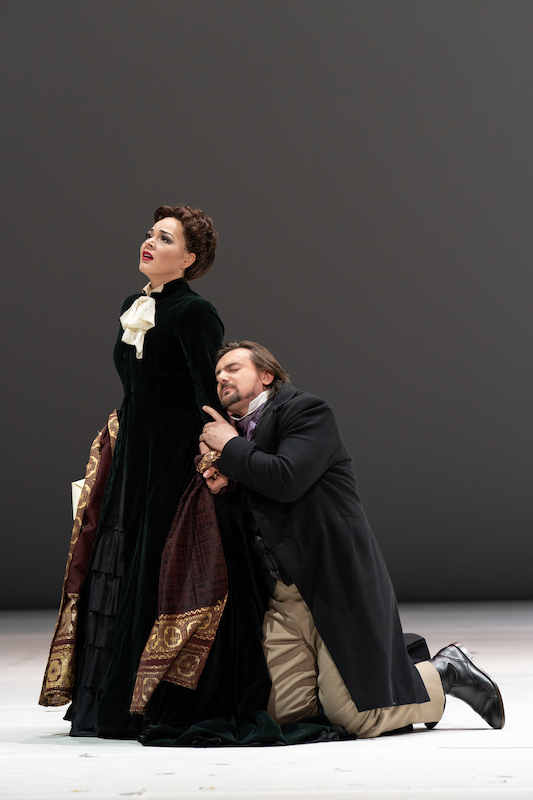Anna Nechaeva makes a powerful U.S. debut in WNO’s “Eugene Onegin”

Anna Nechaeva and Igor Golovatenko star in Tchaikovsky’s “Eugene Onegin” at Washington National Opera. Photo: Scott Suchman
Eugene Onegin has returned to the Washington National Opera after an absence of some thirty years. Tchaikovsky’s gorgeous score about love and bitter regret received a near-ideal performance Saturday night at the Kennedy Center Opera House. Only a handful of performances remain.
The story comes from Alexander Pushkin’s novel in verse of the same name, about a listless aristocrat who has inherited a home in the country. Allergic to all social convention, Onegin dismisses the love of Tatiana, a young girl with her head lost in novels. He quarrels with his friend, an idealistic poet named Lensky, over Tatiana’s flighty sister, Olga, which ends tragically in a duel. After wandering abroad, Onegin returns to St. Petersburg to find that Tatiana has married. Although he now realizes he loves her, it is too late.
The sensation of WNO’s cast is Anna Nechaeva, who made an outstanding U.S. debut as Tatiana. The Russian soprano had all of the vocal qualities for the role, and she imbued the Act I Letter Aria with innocence, passion, and dreaminess. The power of the performance came just as much from her acting abilities, making the character both vulnerable and exalted. Towering strength came later in Act III, when she finally put Onegin in his place, singing with a more mature vocal presence.
Also heard for the first time in the United States is Igor Golovatenko, who made a genuinely hateful Onegin. His mistreatment of Tatiana in Act I is so proud, so self-important that one is glad to see him get his comeuppance in Act III. The Russian baritone’s voice did not have the same polish and focus as that Nechaeva, but he had plenty of ringing volume at the top to communicate the character’s anger and bitterness.
Mezzo-soprano Lindsay Ammann, who excelled as Erda and other roles in the WNO Ring Cycle, used her potent chest range for the comic side of Olga, Tatiana’s younger sister. The production, created by director Robert Carsen, emphasizes from the beginning how unsuitable a match Olga is for the ardent poet Lensky, something suggested by Tchaikovsky’s vocal casting of low and high voices.
Tenor Alexey Dolgov, in the rotation at WNO over the last decade, was a slightly awkward, even nerdy Lensky, the duel’s outcome seeming almost preordained. His costuming and mannerisms risked sidelining him as a sort of bumbling figure in the first act. When he sang his Act II aria before the duel, however, the sobbing quality of Dolgov’s voice on one of Tchaikovsky’s most plangent melodies was outstanding.
The luxury casting extended down to the casting of Madame Larina and the servant Filippyevna in Act I. Mezzo-sopranos Elena Zaremba and Victoria Livengood, respectively, were each outstanding. Eric Halfvarson, so evil as Hagen in the WNO Ring Cycle, turned his potent bass to the almost saintly role of Prince Gremin. Domingo-Cafritz Young Artists filled out the comprimario roles admirably, especially tenor Joshua Blue as a hammy Monsieur Triquet.
The only detail missed in this production was at the podium, where conductor Robert Trevino made a shaky company debut. The orchestra produced beautiful sounds, especially in poignant woodwind countermelodies and powerful brass in the dance numbers, but Trevino too often allowed the pit to overwhelm the singers and ensemble unity was off, especially in numbers featuring the otherwise strong WNO Chorus.
Robert Carsen’s staging, light on sets and heavy on colorful auras of light (designed by Christine A. Binder), comes to Washington from the Canadian Opera Company in Toronto, which picked it up after it was discontinued at the Metropolitan Opera. Overseen at WNO by Peter McClintock, it focuses the eyes mostly on the singers in the 19th-century costumes designed by Michael Levine.
A scrim sometimes obscures the stage, most effectively in the duel scene, where it renders the vibrant blue-purple lighting as mist, leaving the singers visible only as silhouettes. Mini-vignettes added to the orchestral introductions to Acts I and II show the rueful older Onegin revisiting the sites of his earlier mistakes. The sparseness of the staging, therefore, seems like a partial memory of these crucial moments of the character’s personal, self-driven failure.
Eugene Onegin runs through March 29. kennedy-center.org; 202-467-4600
